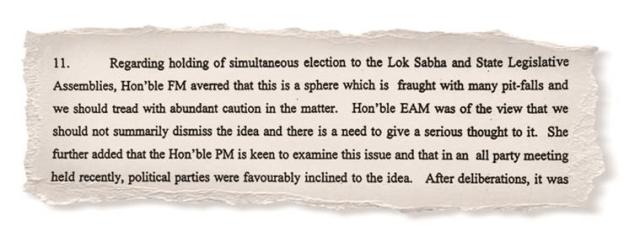
Just weeks after Prime Minister Narendra Modi first pushed for simultaneous elections at a party forum on March 19, 2016, then Finance Minister Arun Jaitley had said the idea is fraught with many pit-falls , according to the minutes of a meeting of a Committee of Ministers (CoM) obtained by The Indian Express under the Right to Information Act.
Simultaneous polls to the Lok Sabha and State Legislative Assemblies has been a constant refrain in Modi s political discourse. Last month, he mentioned it in his Independence Day speech too. He has justified the proposal on several grounds, including a substantive cut in expenditure incurred for conducting separate elections every year.
In early 2016, a Committee of Ministers (CoM), set up to examine the Election Commission s proposal to purchase new EVMs and VVPAT units for Rs 5,200 crore ahead of the 2019 Lok Sabha polls, was asked by the Prime Minister s Office (PMO) to also examine the feasibility of holding simultaneous elections.
At a meeting of the CoM held on April 11, 2016, Jaitley voiced his reservations. Regarding holding of simultaneous election to the Lok Sabha and State Legislative Assemblies, Hon ble FM (Jaitley) averred that this is a sphere which is fraught with many pit-falls and we should tread with abundant caution in the matter, state the minutes of the meeting.
Hon ble EAM (Sushma Swaraj) was of the view that we should not summarily dismiss the idea and there is a need to give a serious thought to it. She further added that the Hon ble PM is keen to examine this issue and that in an all party meeting held recently, political parties were favourably inclined to the idea, state the minutes.

The meeting, chaired by then Home Minister Rajnath Singh, concluded with the members agreeing that the CoM is not the forum to discuss the issue and an expert committee should be assigned to examine the entire gamut of the nuances involved in the issue .
The meeting was also attended by then Law Minister D V Sadananda Gowda, MoS PMO Jitendra Singh, Legislative Department Secretary G Narayana Raju, Bhaskar Khulbe, who was then additional secretary in the PMO, and Deputy Election Commissioners Umesh Sinha and Sudeep Jain.
Jaitley s remarks at an internal meeting assume significance since not many within the party appear to have questioned the proposal of simultaneous elections. So far, only Opposition parties like the Congress, Trinamool Congress, CPI, AIMIM and NCP have expressed reservations and questioned the feasibility, given the existing constitutional provisions on the fixed tenure of State Assemblies and Parliament.
However, speaking at a public event in March 2017, Jaitley had echoed Modi s views on simultaneous polls. It (simultaneous elections) will hugely reduce the quantum of expenditure, because if Lok Sabha and State Assembly elections are held together, the campaigns will be common, and, in a common campaign, the money spent will be much less. It won t be duplicated, PTI quoted him as saying at a discussion on Campaign Finance Reform in India in New Delhi.
Simultaneous elections is a BJP pet project which was flagged by its veteran leader L K Advani in 2011. The EC, as first reported by The Indian Express, expressed its support for simultaneous elections in 2016, provided the legal and financial challenges are overcome.
The first elections to the Lok Sabha and all State Assemblies were held simultaneuosly in 1951-52. This practice continued in the three subsequent general elections held in 1957, 1962 and 1967. But, with the premature dissolution of some State Assemblies in 1968 and 1969, this cycle was disrupted.







0 Comments